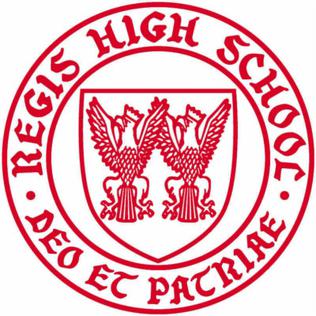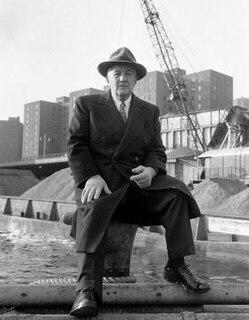Biography
Son of a County Kerry-born policeman in New York's Harlem, Corridan graduated from Manhattan's Regis High School in 1928. Father Corridan was assigned to the Xavier Institute of Industrial Relations on Manhattan's West Side in 1946. He became a passionate advocate of reform in the International Longshoremen's Association waterfront union.
Father Corridan collaborated with Malcolm Johnson in Johnson's articles on waterfront corruption. He was the subject of a 1955 biography, Waterfront Priest by Allen Raymond. The introduction of the book was by Budd Schulberg, screenwriter of On the Waterfront, who described how he met with Father Corridan frequently in researching the screenplay.
Schulberg described Father Corridan as a "tall, youthful, balding, energetic, ruddy-faced Irishman whose speech was a fascinating blend of Hell's Kitchen jargon, baseball slang, the facts and figures of a master in economics and the undeniable humanity of Christ."
Schulberg wrote that Father Corridan "led me to understand that there is nothing unusual about a Catholic priest's involving himself in moral issues that find practical form in the daily lives of his parishioners."
According to a 1983 article in the New York Times , Father Corridan's work was instrumental in formation of the New York-New Jersey Waterfront Commission aimed at curbing waterfront crime. Father Corridan, then retired, told a Times reporter that he believed that conditions on the waterfront had changed over the years.
The Times reported: "When he visited some former colleagues in Manhattan last year, he recalled, current conditions on the docks were barely discussed. 'I'm sure if anything of consequence were going on,' he said, 'somebody would have gotten in touch with me.'"
Father Corridan left the waterfront in 1957 to teach economics at Le Moyne College in Syracuse. He later taught theology at Saint Peter's College in Jersey City and served as a hospital chaplain in Brooklyn. Corridan died of a heart attack on July 1, 1984 at the Misericordia Medical Center in the Bronx. He was 73 years old and had lived in a health-care center at Fordham University.

On the Waterfront is a 1954 American crime drama film, directed by Elia Kazan and written by Budd Schulberg. It stars Marlon Brando and features Karl Malden, Lee J. Cobb, Rod Steiger, Pat Henning, and Eva Marie Saint in her film debut. The musical score was composed by Leonard Bernstein. The film was suggested by "Crime on the Waterfront" by Malcolm Johnson, a series of articles published in November–December 1948 in the New York Sun which won the 1949 Pulitzer Prize for Local Reporting, but the screenplay by Budd Schulberg is directly based on his own original story. The film focuses on union violence and corruption amongst longshoremen, while detailing widespread corruption, extortion, and racketeering on the waterfronts of Hoboken, New Jersey.

New York Harbor is at the mouth of the Hudson River where it empties into New York Bay near the East River tidal estuary, and then into the Atlantic Ocean on the east coast of the United States. It is one of the largest natural harbors in the world. Although the United States Board on Geographic Names does not use the term, New York Harbor has important historical, governmental, commercial, and ecological usages. It is the largest part of the Port of New York and New Jersey.

Budd Schulberg was an American screenwriter, television producer, novelist and sports writer. He was known for his novels What Makes Sammy Run? and The Harder They Fall, his Academy Award-winning screenplay for On the Waterfront, and his screenplay for A Face in the Crowd.

Xavier High School is an independent university-preparatory high school for boys run by the USA Northeast Province of the Society of Jesus in the Chelsea neighborhood of Manhattan, New York City. It was founded in 1847, as the College of St. Francis Xavier by John Larkin.

Exchange Place is a district of Downtown Jersey City, New Jersey, United States, that is sometimes referred to as "Wall Street West" due to the concentration of financial companies that have offices there. The namesake is a square, about 200 feet long, at the foot of Montgomery Street at the Hudson River. This square was created by landfilling the shore at Paulus Hook, and has been a major transportation hub since the colonial era.

Regis High School is a private Jesuit secondary school for Roman Catholic boys located on the Upper East Side of Manhattan in New York City. In 2017, Regis was ranked as the top Catholic High School in the US by Town and CountyMagazine. Regis was also ranked as the #1 Catholic High School in the US by niche.com in 2017, 2018, 2019, 2020, and 2021.

B. P. Schulberg was an American pioneer film producer and film studio executive.
Walter Joseph Ciszek, S.J. was a Polish-American Jesuit priest who conducted clandestine missionary work in the Soviet Union between 1939 and 1963.

Pavonia Terminal was the Erie Railroad terminal on the Hudson River situated on the landfilled Harsimus Cove in Jersey City, New Jersey. The station opened in 1861 and closed in 1958 when the Erie Railroad moved its passenger services to nearby Hoboken Terminal. The New York, Susquehanna and Western Railway also ran commuter trains from the terminal and various street cars, ferries and the underground Hudson and Manhattan Railroad serviced the station. The station was abandoned in 1958 and demolished in 1961. The site was eventually redeveloped into the Newport district in the late 20th century.
The Waterfront Commission of New York Harbor (WCNYH) is a regulatory agency in Port of New York and New Jersey in the United States. The bi-state agency was founded in 1953 by a Congressional authorized compact between New York and New Jersey "for the purpose of eliminating various evils on the waterfront in the Port of New York Harbor." Under statutory mandate, the mission of the commission is to investigate, deter, combat and remedy criminal activity and influence in the port district and also ensures fair hiring and employment practices. New Jersey attempted to withdraw from the pact in 2018.
Malcolm Johnson was an American investigative journalist of the 1940s and 1950s. His 24-part series in the New York Sun, Crime on the Waterfront, won the Pulitzer Prize for Local Reporting in 1949.
Joseph Aloysius O'Hare was a Jesuit priest, New York City civic leader and editor. He was president of Fordham University from 1984 to 2003 and chaired New York City's Campaign Finance Board for its first fifteen years from 1988 to 2003.
Richard Joseph "Peg Leg" Lonergan was an American underworld figure and labor racketeer. He was a high-ranking member and the final leader of the White Hand Gang. He succeeded Bill Lovett after his murder in 1923 and, under his leadership, led a two-year campaign against Frankie Yale over the New York waterfront until he and five of his lieutenants were killed in South Brooklyn during a Christmas Day celebration at the Adonis Social Club in 1925.
Jay William Schulberg was an American advertising executive who had chief creative positions at both Ogilvy & Mather and Bozell Worldwide, with an approach to developing concise ads with memorable taglines. He was responsible for creating many notable advertising campaigns including the Got Milk? milk mustache campaign, the "Excedrin Headache" that could only be cured by the "extra-strength pain reliever", and the American Express" Don't Leave Home Without It" campaign with Karl Malden as spokesman.
Harvey Breit was an American poet, editor, and playwright as well as reviewer for The New York Times Book Review from 1943 to 1957.

William J. McCormack was a successful New York City businessman of the first half of the twentieth century. McCormack was born in Jersey City, New Jersey to Great Famine immigrants from County Monaghan, Ireland. McCormack began life as a grocer's wagon-boy running errands along New York's West Side docks and went on to establish Penn Stevedoring, one of the most important produce handlers in the United States.
William L. Reilly, S.J., was an American Jesuit and academic. He was the longest-serving president of Le Moyne College in Syracuse, New York. His twelve-year term lasted from 1964 to 1976.
Charles J. Beirne, S.J. was an American Jesuit and academic administrator. Beirne served as the 11th President of Le Moyne College in Syracuse, New York, from 2000 until 2007. During his seven-year tenure, Beirne oversaw the drafting of a new mission statement, launched in the largest capital campaign in Le Moyne's history, grossing $91 million by June 2010 when the campaign ended, and adopted a twenty-year architectural plan for the campus.
Garry Pastore is an American actor, stuntman, writer, and filmmaker.








